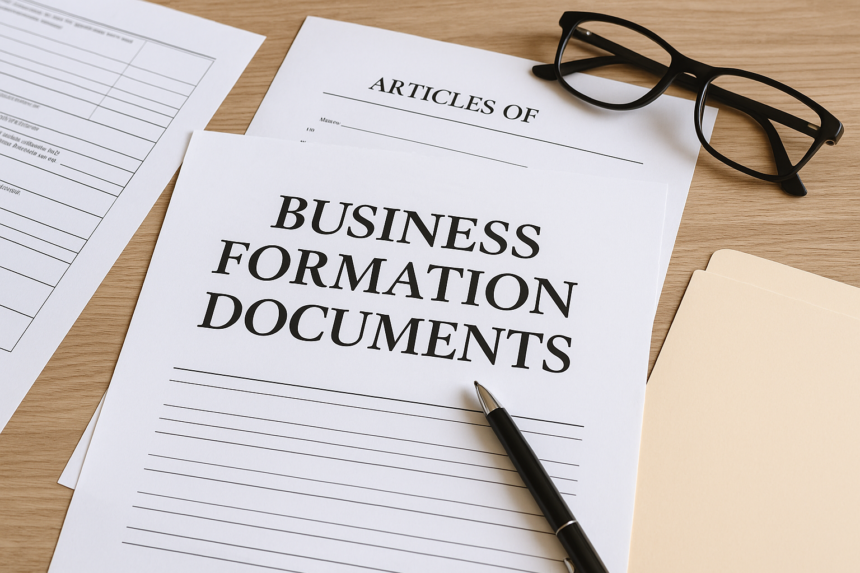The need to validate corporate legitimacy has become essential during the digital age when businesses operate across borders. The Know Your Business (KYB) process depends on Business Formation Documents to secure the identification and authentication and validation of business entities throughout all industries.
Understanding the nature and importance of Business Formation Documents remains essential because it helps financial platforms and B2B marketplaces and crypto exchanges fulfill their KYB compliance requirements while safeguarding their platforms against fraud and financial crime and regulatory penalties.
What Are Business Formation Documents?
The official legal papers known as Business Formation Documents establish business entity existence and function under the names of company formation documents or incorporation documents. The government authority which certifies or issues these documents provides essential company information through standardized documents that include key business details.
- Business name and registration number
- Business Structure (e.g., LLC, corporation, partnership)
- Date of incorporation
- Jurisdiction of formation
- Registered address
- Names of directors or founders
The documents act as legal evidence to show both the existence and proper operation of companies within their jurisdictional laws.
Why Business Formation Documents Matter in KYB Compliance
Financial institutions and platforms must execute complete identity and legitimacy assessments of their business customers through Know Your Business (KYB) verification procedures. Most regions worldwide have established KYB compliance as a mandatory requirement which affects financial institutions and digital payment providers and crypto asset operators.
The KYB verification process depends on these Business Formation Documents to achieve compliance.
1. Verifying Legal Existence
The verification process starts by validating that the business holds valid legal registration status. These documents serve as proof through their names like Certificates of Incorporation or Articles of Association. Business verification depends on these documents to confirm that the entity exists as a real business entity rather than a front company.
2. Understanding Business Structure
Business Structure functions as an essential element which helps risk assessment during KYB checks. The entity exists as either a sole proprietorship or limited liability company or partnership. Business entities with different organizational types have unique regulatory and risk exposure requirements. The legal structure of a company becomes clear through Business Formation Documents which allows compliance teams to make more precise risk assessments.
3. Identifying Beneficial Owners
Company documents that establish business operations usually reveal information about directors and shareholders. The identification of Ultimate Beneficial Owners (UBOs) becomes possible through this vital information which complies with global Anti-Money Laundering (AML) laws. The identification of business control helps stop criminals from using corporate structures to conceal their identity.
4. Cross-Border Verification
In an increasingly global economy, many platforms onboard international clients. The process of authenticating companies operating outside your jurisdiction proves to be difficult. Companies use standardized Business Formation Documents to conduct international due diligence through certified and apostilled documentation.
5. Ongoing Monitoring & Updates
The structure of a business together with its ownership and legal status may undergo modifications. The documentation of business formation enables quicker detection of any modifications that take place within the company. Business verification throughout time becomes achievable through this process which is essential for compliance maintenance.
Common Types of Business Formation Documents
Businesses operating under different jurisdictions and types might need to present various documents which include:
Certificate of Incorporation
Proof of legal registration and existence.
Articles of Association / Memorandum of Association
The document establishes the company rules and structure in addition to its internal governance system.
Business License or Registration Certificate
The document serves as authorization for business operations within a particular market area.
Company Extract / Corporate Profile
The summary issued by the registry includes active business information.
The Role of Automation in Business Document Verification
Current KYB platforms provide automated business verification solutions which conduct real-time verification and validation of company formation documents. These tools perform instant checks through their access to government registries and global databases and sanctions lists which reduces both friction and enables large-scale compliance.
Your KYB process will benefit from automated document checks because it enables faster client onboarding and decreased manual errors while enhancing your compliance capabilities.
Final Thoughts
The digital economy operates on two fundamental elements which are trust and compliance. Any comprehensive KYB framework must begin with Business Formation Documents which help organizations validate their partners while complying with current and emerging regulatory requirements.
Business Formation Documents play an essential role in establishing secure B2B operations that are both compliant and scalable because they help verify business structure and UBOs. The evolution of regulatory requirements and threats demands that your business verification approach starts with fundamental principles.
For platforms that process corporate onboarding you must implement a KYB procedure which effectively collects and validates Business Formation Documents. The practice of business compliance brings additional value to your operations.






